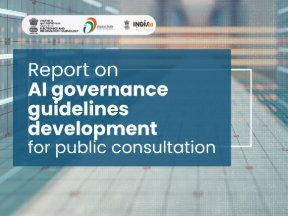Results for ""
Over the next few years, India is expected to be a major player in the AI domain. 57% of IT professionals in India report actively deploying AI in their businesses, as per a recent study by Morning Consult on behalf of IBM. With this background, we reached out to Siddhesh Naik, Data, AI & Automation sales leader, IBM Technology Sales, IBM India/South Asia, to understand the challenges and strategy ahead for businesses with limited resources.
“There is no doubt that India is in the midst of an Artificial Intelligence (AI) revolution. Much progress has been made with AI since the nineties, and there has been a recent boom in activity, especially with self-driving cars, chatbots, and digital assistants,” said Siddhesh. He has more than 22 years of experience in the IT marketplace and has been with IBM for over 19 years in various roles.
Digitisation soared with the flow of the pandemic, and so did AI adoption. Siddhesh outlines that organisations are using AI to augment their core business processes and services. Further, three major trends are visible,
- First, businesses are using AI to stay competitive and operate more efficiently using automation use cases.
- Secondly, effective data management and AI deployment go hand-in-hand because leveraging data across a company is difficult without the right tools.
- Lastly, it is crucial to explain how the AI came to a decision in order to ensure trust in AI.
Siddhesh believes with IBM's AI for business solutions, companies can scale AI with key capabilities such as natural language processing, trust, automation and the ability to run anywhere across any hybrid or multi-cloud environment. However, the path is filled with obstacles.
Barriers to cross
Companies need to clear obstacles before realising successful AI adoption, including limited AI skills, expertise, or knowledge; a lack of tools or platforms to develop models; projects that are too complex or hard to integrate or scale; and too much data complexity. Further, data remains a challenge for Indian enterprises, including diverse data sources, types, structures, environments and platforms. This multi-dimensional predicament is further complicated with the hybrid and multi-cloud architectures. For many enterprises today, operational data has remained siloed and hidden, leading to an enormous amount of dark data.
“To help organisations address data complexity challenges, we propose a data fabric approach - a strategy that allows businesses to use the disparate data sources and storage repositories (databases, data lakes, data warehouses) and simplify data access,” said Siddhesh.
Another challenge remains when it comes to trustworthy and responsible AI systems, as organisations have not yet taken concrete steps to reduce bias, monitor performance variations and model drift, and explain AI-powered decisions.
What IBM has in its bucket for businesses
IBM is helping to meet the accelerating demand for AI and helping organisations overcome the barriers to adoption with IBM Watson, says Siddhesh. It provides cutting-edge AI capabilities for users with a range of AI skills,
For business users: Watson provides clients with pre-built AI applications that run anywhere like Watson Assistant, Watson Discovery, Planning Analytics with Watson, Cognos Analytics with Watson, IBM OpenPages with Watson or Watson Orchestrate that are targeted at solving a specific business problem, such as customer care, risk management, planning and forecasting, or supply chain management.
For developers and data scientists: Watson provides tools like Watson Studio on IBM Cloud Pak for Data to help build and deploy AI anywhere. These tools help an organisation collect data, organize data, build AI models that are fair, put AI models into production, and manage those models throughout the entire lifecycle.
Capabilities for Security Professionals: As cyberattacks grow in volume and complexity, IBM is applying AI to help under-resourced security operations analysts stay ahead of threats. IBM Cloud Pak® for Security is an open security platform that can advance a zero-trust strategy, take advantage of existing investments and help teams collaborate safely and securely. Recent acquisitions such as ReaQta have furthered IBM’s ability to use AI to identify and manage threats while remaining undetectable to adversaries.
Capabilities to build a more resilient, sustainable business: Due to climate change and extreme weather events, business leaders are finding it increasingly difficult to predict how their operations will be affected. With IBM Environmental Intelligence Suite, organisations gain timely, fact-based, actionable intelligence that can be used to proactively plan for and manage the economic impact of severe weather and climate change events.
Take on AI infrastructure
Talking about the state of AI in India, Siddhesh said, “At a time when AI-based applications are expanding into uncharted business and society realms, Indian policymakers are charting its potential for growth and social transformation. The Indian government's policy think-tank, NITI Aayog, is actively working on the AI for All program to democratise AI usage. Additionally, the Government intends to leverage AI for healthcare, agriculture and e-government under the Digital India initiative.”
However, building a skilled talent pool should be the priority for both organisations and the government. Currently, the market for highly-qualified, experienced, and technically adept AI professionals far exceeds the supply. In order to bridge this gap, the government and industry bodies should take upskilling and training initiatives.
He further pointed out that governments and businesses should prepare proactively for the growing use of artificial intelligence to make crucial decisions. Enterprises should define and adopt safety standards before adopting AI to manage their regulatory, financial, operational, technological, and brand risks. “AI must be governed, and trustworthiness metrics must be established,” concluded Siddhesh.

Report on AI governance guidelines development
India recognizes the potential and challenges of AI. An Advisory Group, chaired by the Principal Scientific Advisor
Article AI Governance Jan 06, 2025

Seismic shift: AI-driven earthquake prediction for a safer future in 2025
AI Predicts Earthquakes with 70% Accuracy
Article Earthquake Jan 07, 2025


















